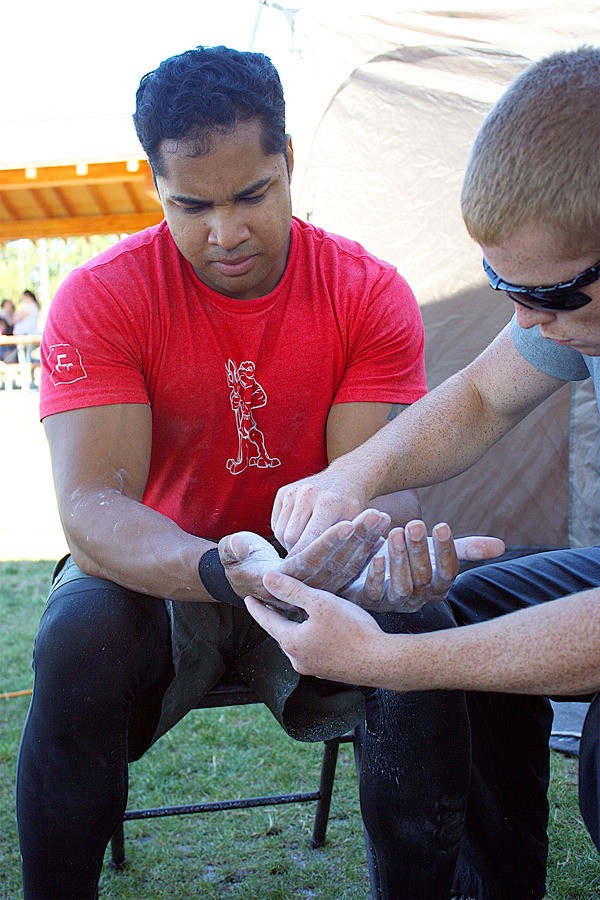At about pullup number 2,100 this past Saturday, Navy Petty Officer Michael McCastle began to experience muscle tears in his forearms and capillaries were bursting on his skin.
He decided then to do 1,000 more.
A total of 3,202 pullups after starting, McCastle was transferred to Providence Regional Medical Center in Everett Monday after spending two days at Whidbey General Hospital.
While McCastle stopped 828 short of surpassing the Guinness World Record for number of pullups in 24 hours, he said the attempt — and exposure it’s given to the Wounded Warrior Project — was worth it.
McCastle said he also discovered something about himself.
“I found that even when I feel I’ve reached my limit, I’m only at 40 percent of what I’m capable of,” McCastle said Monday. “After that event, I don’t think anything is impossible.”
At last count, McCastle raised $9,600 for the Wounded Warrior Project, just shy of his $10,000 goal.
The current world record for this feat is held by Navy SEAL David Goggins, who completed 4,030 pullups last year in 24 hours. It took Goggins three attempts to break the previous record.
McCastle, a 28-year-old personal trainer and air traffic controller for Whidbey Island Naval Air Station, has run multiple marathons and ran 30 miles last year to support cancer research.
Because he wasn’t physically gifted in high school, McCastle said he’s had to work hard for everything and he uses that drive to push himself.
Instead of wrapping his hands or wearing gloves, which would have created tear-inducing moisture, McCastle used grip pads. Still, his hands began to blister and peel several hours into the event, which was treated with a fast drying chalk.
“Not only were the pullups hard, but I had a separate battle with my hands,” McCastle said.
McCastle said there was also a hiccup in his plan.
After starting at 6 a.m., the video recorder stopped working. Feats must be recorded continuously and submitted to Guinness for consideration.
Because McCastle had to stop for about an hour to manage the technical difficulties, he said his body got cold and he lost valuable time.
McCastle said he knew the video malfunction might jeopardize his shot at beating the world record, but he told himself, “There’s a bigger picture.”
“Just because one part of your plan fails, it doesn’t mean your mission failed,” McCastle said. “It was about the amount of exposure I could bring to that Wounded Warrior Project. But that was a hard thing to accept.”
After restarting, he upped his reps per minute from five to eight every third set, a rate he had not trained for, one that taxed his body.
“So I’m playing catch up,” McCastle said. “I was pretty much already burning myself out.”
At around 2,100, McCastle began feeling micro tears in his forearms, an “excruciating” pain he described as like being branded or tattooed but with “more violent tugging.” After a couple of breaks, McCastle also found he was urinating blood as a result of the rapid muscle break down.
“I knew then the record was in danger of not being met,” McCastle said. “That didn’t mean I was going to give up.
“You can still push yourself.”
McCastle said after 3,000 he took a 30-minute break. He said the breaks were less about resting his fatiguing muscles and more about getting his head in the right space.
Toward the end, the period he calls “the dark sets,” he said he really had to dig deep for each set.
“Each time I pushed my body up to that bar, it was a transcendent experience,” McCastle said.
“I can’t describe it. It was about me and what decision Mike McCastle wants to make.”
At 1:30 a.m., McCastle tried one last time to pull himself up but was unable to close his hands.
“All my guitar strings, my tendons, were so inflamed I couldn’t make a fist,” he said.
McCastle went immediately to Whidbey General Hospital for a checkup and was admitted for lactic acidosis, a condition that occurs when cells leak toxic amounts of lactic acid into the blood stream. He said his entire body was in pain and doctors were concerned that his heartbeat had dropped to a dangerously low level.
For that reason, McCastle was transferred to Providence Regional Medical Center for observation because they have the capability of putting in a heart pacer if needed.
“It’s just a precaution,” McCastle said.
Moving forward, McCastle said he plans to take on thepull-up challenge again until he can beat it. He also plans to pursue his dream to become a Navy SEAL.
For him, it’s all about finding his limitations.
“I need to know if there’s limits to the human soul,” McCastle said. “When I say I’m going to do something, I do it then and there.
“That’s how I need to experience life.”



